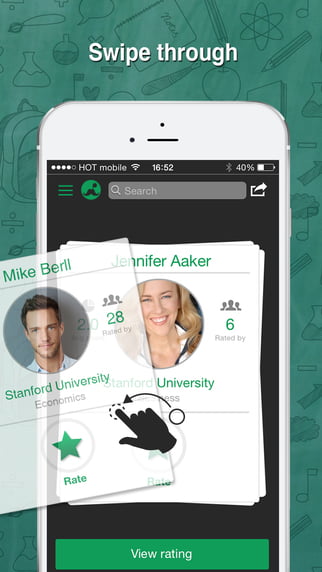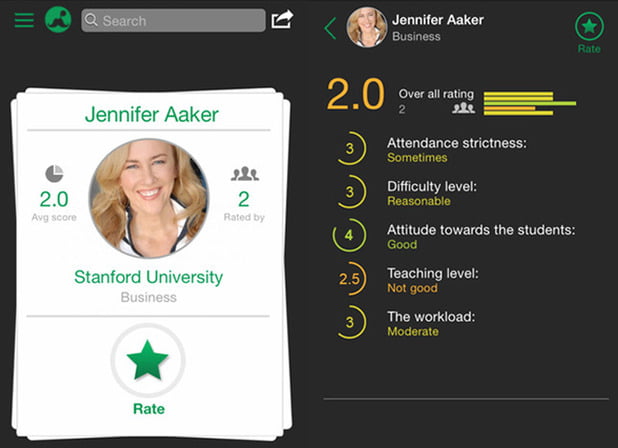Though course evaluations are nothing new, when students evaluate their professors at the end of a semester, their invaluable feedback and opinions quickly slip out of their hands and into the university’s. This information is then usually lost on those who may benefit from it most, namely students’ peers, which is where GradeBack comes in.
“GradeBack was created so students can share information, decide which classes to take and be able to express their feelings towards certain courses”, says parent company Cloudents’ CEO Eidan Apelbaum.
The ‘Tinder’ of prof. ratings
Available for Android and iOS, students are asked to “sign into” GradeBack using their Google or Facebook account so that the platform’s matching algorithm can get to work. GradeBack is able to determine what school the student attends and who their professors are automatically based on their Facebook relations and pools of friends, and using Cloudents’ social studying data. Students are then presented with the profile of a professor in their field of study that includes a picture, their name, and their average score on the platform. Students continue to swipe left or right to view more professors (much like dating app Tinder), rating them on factors like the heftiness of the workload, likeability, attitude towards students, and more in a 1-5 numbered format similar to standard professor reviews (“always” to “never”).
SEE ALSO: The Top Israeli Apps Taking Over The Apple Watch
 Surprisingly, the app has not turned into an opportunity for students to bash their professors; according to Apelbaum, “You would expect that they would rant on professors, but the average rating is 4.23 for a prof. Out of 647 verbal comments, only 7 percent were bad reviews.” The positive reviews may have a lot to do with what is GradeBack’s truly stand-out feature: complete anonymity. Despite identifying students’ networks through their social media data, GradeBack’s anonymous feature gives students more freedom to express their true feelings about their professors.
Surprisingly, the app has not turned into an opportunity for students to bash their professors; according to Apelbaum, “You would expect that they would rant on professors, but the average rating is 4.23 for a prof. Out of 647 verbal comments, only 7 percent were bad reviews.” The positive reviews may have a lot to do with what is GradeBack’s truly stand-out feature: complete anonymity. Despite identifying students’ networks through their social media data, GradeBack’s anonymous feature gives students more freedom to express their true feelings about their professors.
Rating professors while remaining anonymous
Sign up for our free weekly newsletter
SubscribeThere are quite a few edtech apps (education technology apps) that are similar to GradeBack in their mission to bring professorial ratings online, like Ratemyprofessor.com or Quiz It, yet these are full websites, making GradeBack the only available app with anonymity.
“The hope for GradeBack is that students will develop their skills through better decision making in an improved system to meet the new age of communication and technology. Our format gives students the option to casually review their professors on a daily basis, with most students spending an average of 22 minutes reviewing their professors. That’s more than most sessions Facebook,” Apelbaum asserts.
Connectivity problems
Possibly one of the biggest downsides of GradeBack’s platform is its lack of connectivity with Cloudents. Though Cloudents, a global social studying platform that aims to help students collaborate on their class work, was meant to expand on GradeBack’s features, the two platforms have not yet been connected. Cloudents, which was Apelbaum and co-founder Matan Libis’s first company, includes a bunch of useful academic information, like prior exams, assignments and syllabuses, but this is not yet available on GradeBack. Maybe most importantly, although Gradeback is a new app, the list of professors does not seem to be synching to a more updated database.
SEE ALSO: App Of The Week: ‘Clean’ – The App That Makes It Easy To Delete Old Photos
Cloudents raised $1 million dollars in its seed funding, which the company plans to use to continue growing its platforms. Though it’s by no means a new concept, it was only a matter of time before students began rating their professors in real time from their smartphones.
Photos: Joseph Shemuel
Related posts

Editors’ & Readers’ Choice: 10 Favorite NoCamels Articles

Forward Facing: What Does The Future Hold For Israeli High-Tech?

Impact Innovation: Israeli Startups That Could Shape Our Future





Facebook comments